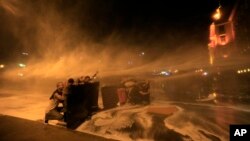Lebanese security forces fired tear gas and water cannons to break up an anti-government protest in Beirut on Thursday, and the country's fractious leaders postponed talks aimed at resolving a political crisis that is feeding public discontent.
Anger at Lebanon's government has fueled repeated protests in recent months.
Discontent with widely perceived corruption and incompetence came to a head in July when the government failed to agree a solution to a trash disposal crisis and piles of garbage were left to fester in the streets.
Protesters threw projectiles including rocks at a line of riot police blocking the way to the Lebanese parliament in Beirut's commercial district. Live TV footage showed at least one injured riot policeman on the ground.
Three dozen people were taken to hospitals suffering from suffocation as a result of tear gas, medics said. Six policemen were also wounded, a security official said.
The Lebanese government grouping of rival factions has struggled to make even basic decisions since it was formed last year. Lebanon has also been without a president for more than a year in the absence of a deal on who should take the post.
The crisis is linked to wider regional turmoil, including the war in neighboring Syria, which has driven well over 1 million refugees into Lebanon. Lebanon's opposing political blocs are backed by rival states Saudi Arabia and Iran, which also back the warring sides in Syria.
Lebanon's parliament speaker canceled the last day of this week's session aimed at discussing ways out of the political crisis after politicians made no progress on issues including high-level security appointments, the National News Agency said.
The three-day "national dialogue" called by Nabih Berri started Tuesday and was aimed at finding solutions to the stalemate. The talks were set to run into Thursday but Berri postponed the next session until October 26.
Saudi Arabia backs the Sunni-led Future Movement of former Prime Minister Saad al-Hariri. Iran backs the Shi'ite party Hezbollah, a powerful armed group, and its allies.
The anti-government rallies have been organized independently of the main sectarian parties in a direct challenge to the political system they control.












